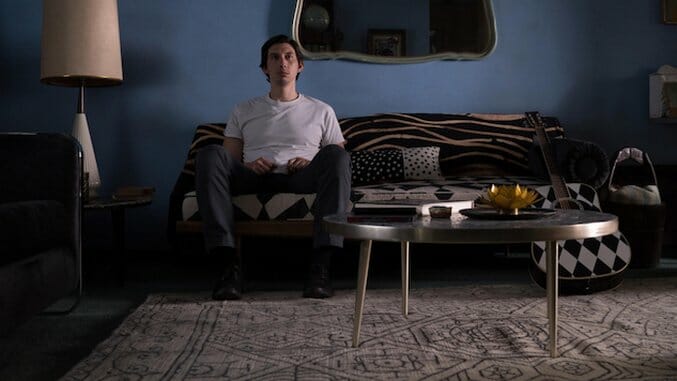Paterson

Like Chantal Akerman’s ascetic classic Jeanne Dielman, 23 Quai du Commerce, 1080 Bruxelles, Jim Jarmusch’s Paterson concerns itself with routine. The film conditions you to jive with its particular rhythm, in part so you might feel the impact experienced by our hero when the unexpected punctuates what’s regular in this average person’s life. Only where Jeanne Dielman depicted the day-in-day-out of working-class life as a monotonous horror show, Paterson takes an altogether different tack. To Jarmusch, the everyday existence of blue-collar individuals like bus driver-poet Paterson (Adam Driver)—whom we observe across a single week—is so simple as to be near transcendent.
In Paterson, the repetition is soothingly reassuring—or played for comedic effect, such as when the crooked mail box that Paterson replants upright each day he arrives home is revealed to have been knocked down by his wife Laura’s (Golshifteh Farahani) dog all along. Paterson wakes, eats his cereal, walks to work through the quiet New Jersey town with which he shares a name, writes poetry in the bus depot, shuttles commuters around while his words play out in his head, then he clocks off, has dinner with his wife, takes the dog for a walk and gets a beer at the local bar. He repeats this pattern, almost uninterrupted, every day. When he’s thrown off by something out of the ordinary occurring, we understand what drama means to most people. Paterson isn’t a superhero, just a guy who like millions each day keeps it predictable so that everything may run according to plan.
Appropriately for one so austere, Paterson is a film driven less by music than Jarmusch’s other works. Composer Carter Logan provides a fine minimalist background score, but it’s the silence, and the constant faint clattering of the streets one notices. This is a deeply human film, one that uses sound to remind us that there are always other stories happening, other lives being lived out there. Paterson is a man fascinated by the people all around him, like the two students who ride his bus and discuss anarchism, or the young girl who recites to him a poem as he makes his way home one Thursday. When he isn’t silently observing the world, Paterson ponders his own poetry, beautifully mundane observations written for the film by Ron Padgett and spoken in matter-of-fact voiceover by Driver. These speak of Blue Tip matches and the fourth dimension; they reveal Paterson’s nostalgic bent and, crucial to this story, his fathomless love for his partner.
-

-

-

-

-

-

-

-

-

-

-

-

-

-

-

-

-

-

-

-

-

-

-

-

-

-

-

-

-

-

-

-

-

-

-

-

-

-

-

-








































